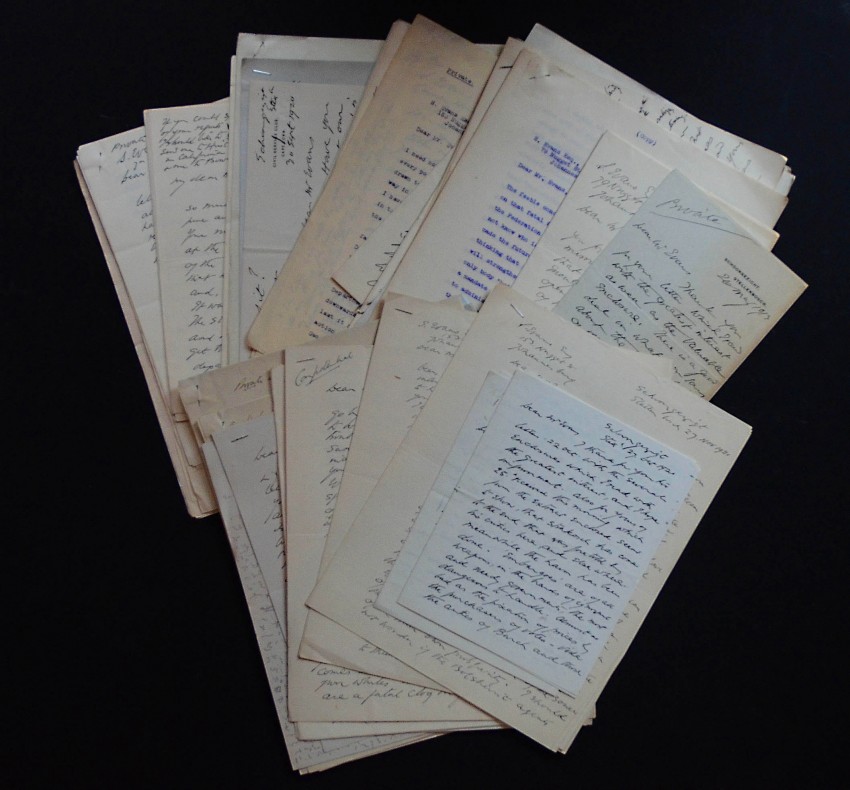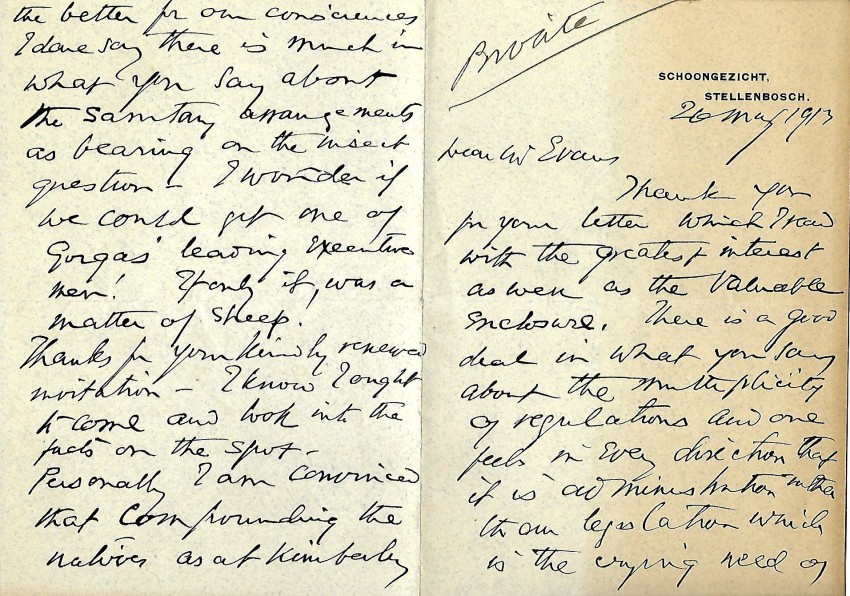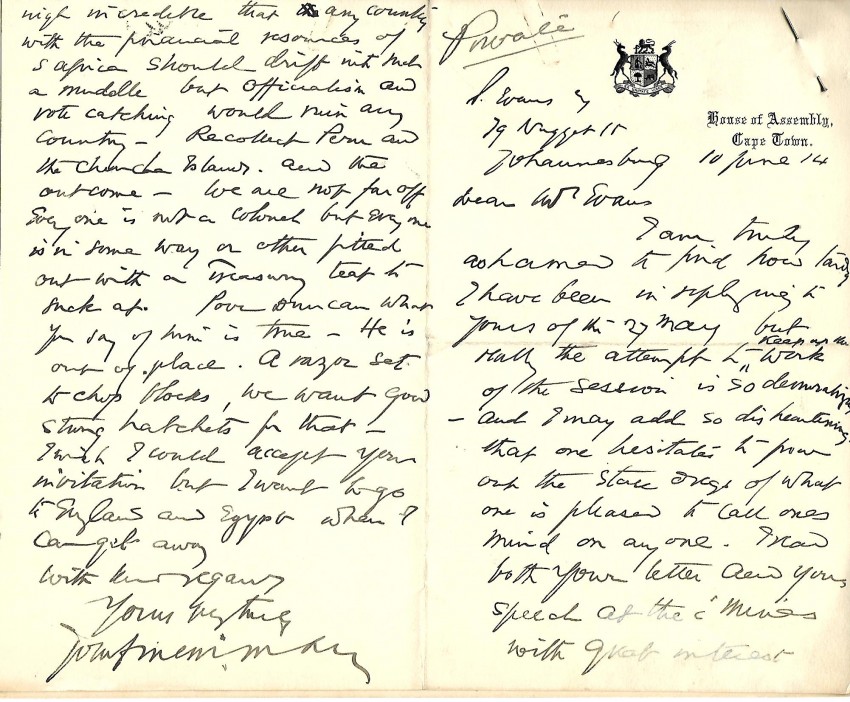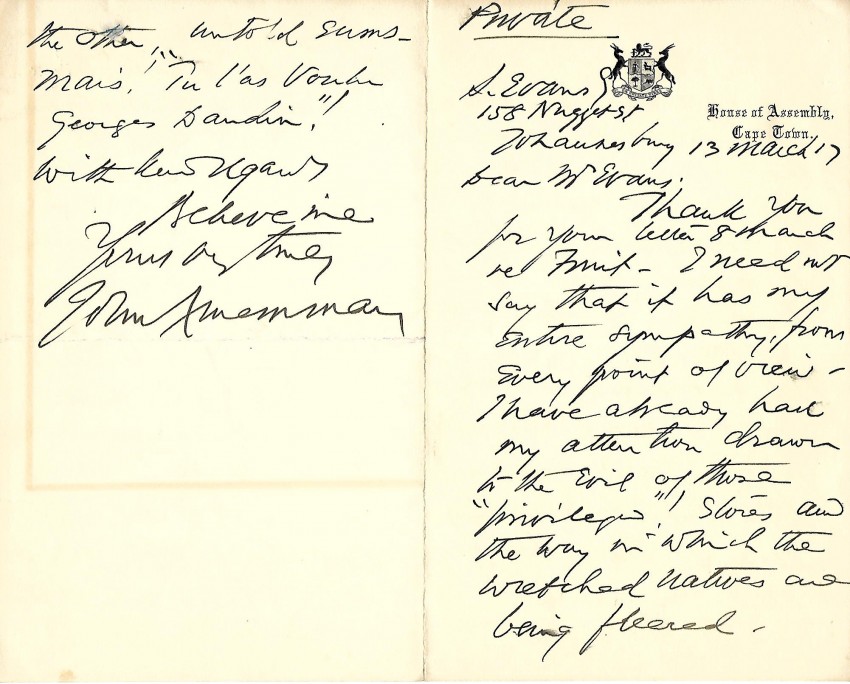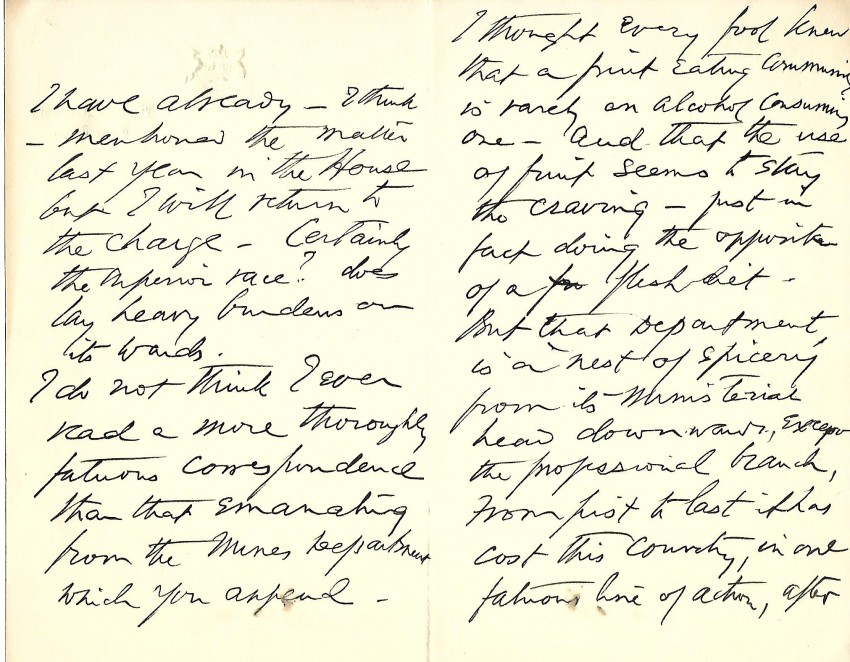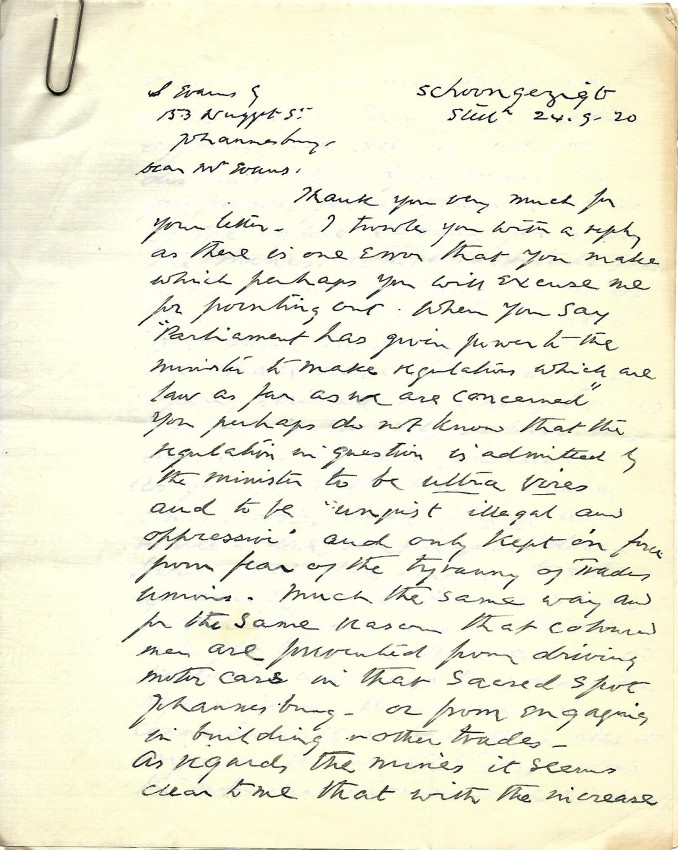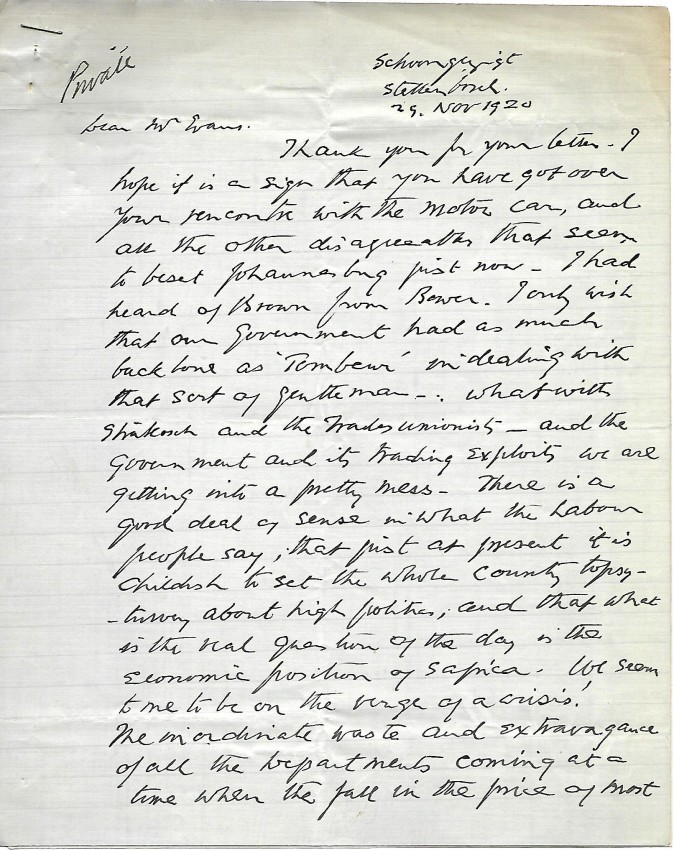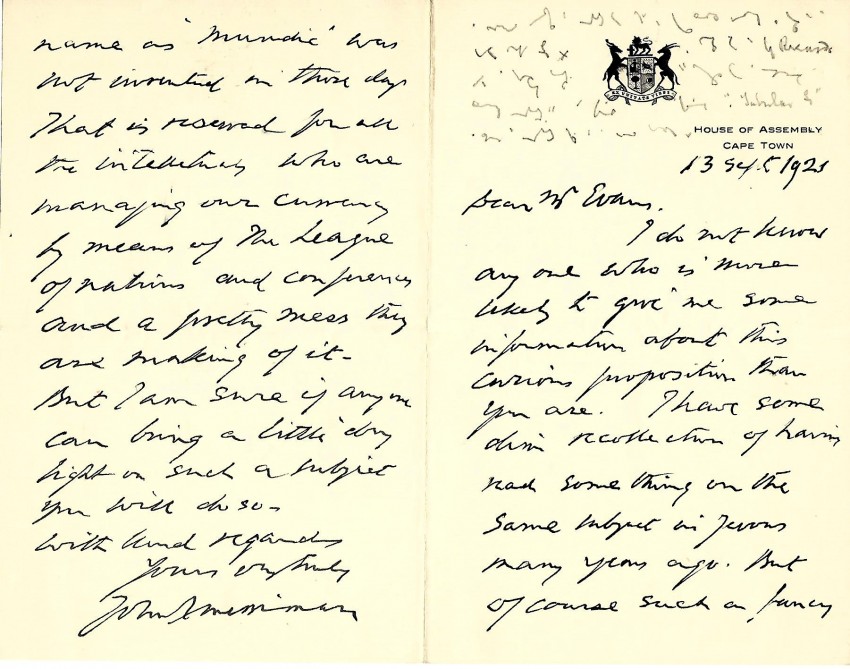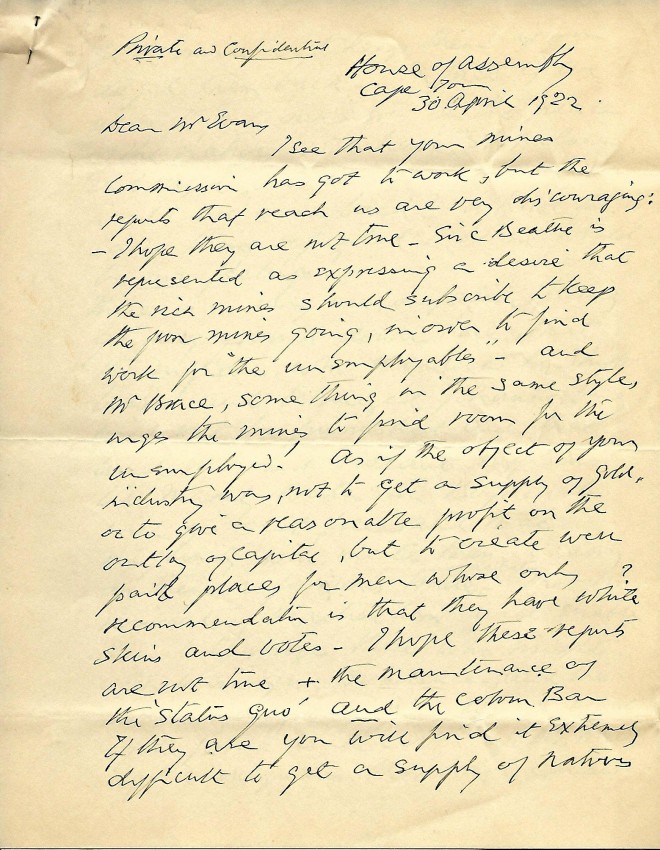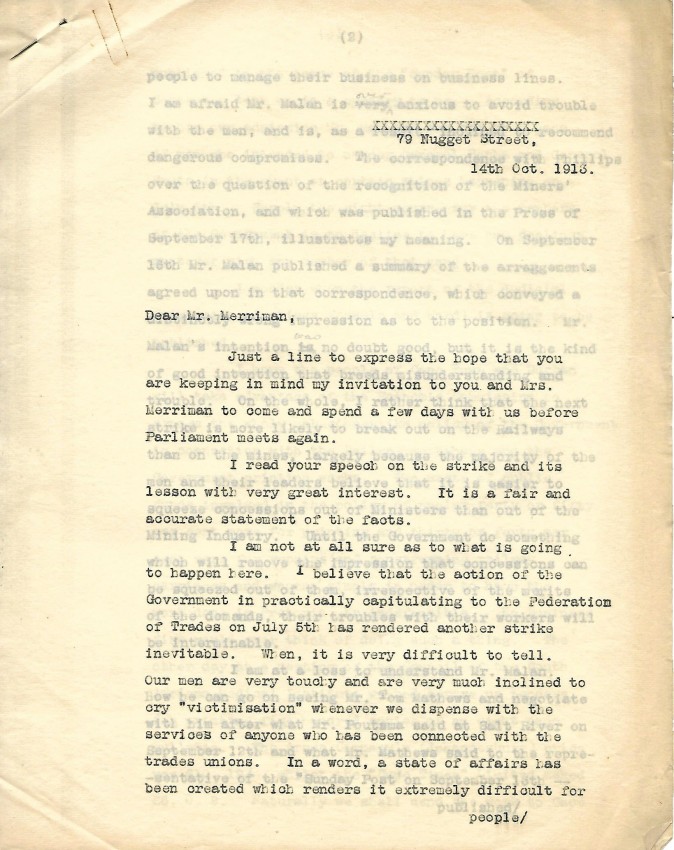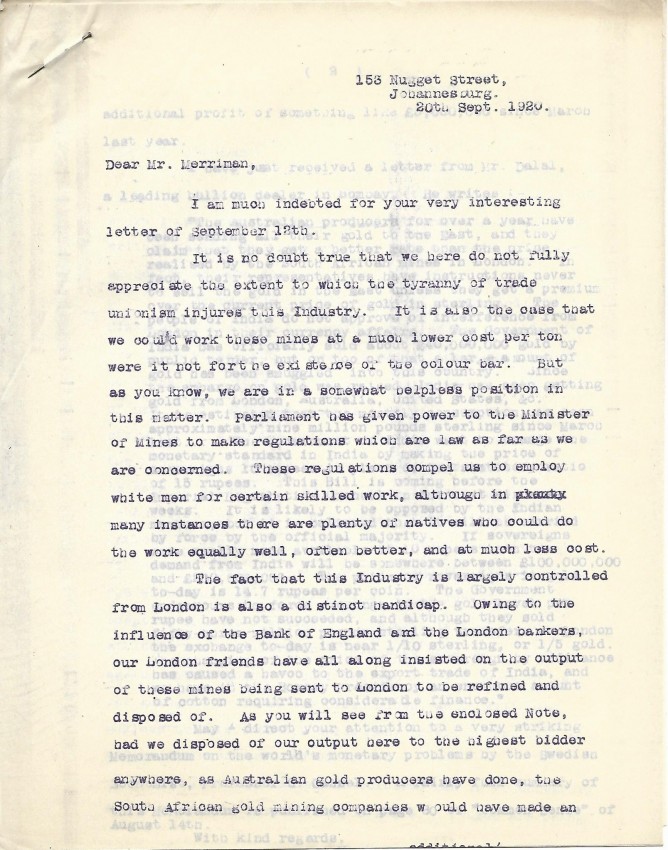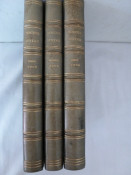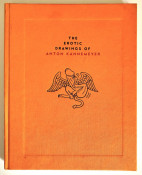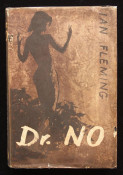An extensive correspondence of 42 signed autograph letters from John X. Merriman, the last Prime Minister of the Cape of Good Hope, and Samuel Evans, the Chairman and M.D. of Crown Mines. Dated from 26th. May 1913 until 22nd. July 1922 and written either from Schoongesicht or Parliament with several on House of Assembly, Union of S. Africa letterheads. The letters, on different size pages, vary in length form in from 1 to 8 pp. Together circa 172 hand written pages, jam packed with information. Several of the letters are accompanied by (? secretarial) ribbon typescript transcripts or in some cases secretarial shorthand notes. Two additional Merriman to Evans letters seem to lack the original handwritten copies and are present only as typescript transcripts. The archive also includes a more or less equivalent number of carbon typescript copies of Evans’ detailed letters to Merriman, rendering the dialogue between the two of them complete. A remarkable archive dealing with, amongst others, matters political, economic, mining, racial (expressing some liberal ideas) including mining staff and conditions, the Mineworkers strike of 1913 and the Rand Rebellion of 1922. The correspondence is too extensive to cover adequately, but below please read a few extracts of the Merriman letters which will give the flavour of the communication.
- "26th. May, 1913. “Personally I am convinced that compounding the natives as at Kimberley would help the other problems regarding health as well as morals. The working men dread it because it makes the natives more efficient and removes one of the great grievances on which they can rely for their nostrum of 'white labour'!"
- "13th August 1913. What is not sufficiently grasped is the fact which is, of course, familiar to you, viz. that you are running the most artificial industry in the world – where your profits are the, as you rightly say, enormous wages of the Europeans rests on a foundation of cheap, underpaid labour, whom we agree to treat as mere cattle, body and soul – and whom we forbid to rise or to exercise their abilities. How long can this last?..... the key to the solution is in humanising and improving the native condition. Otherwise you are only pampering their overlords, the European workmen."
- "9th. November 1914. It seems odd that tahis most aimless and contemptible of all rebellions should have lasted so long or have acquired such importance. This must be put down in great measure to the fatal habit of palaver which seems ingrained in South African natives."
- "29th. November 1920". Critical of Smuts’ decision to call a general election. "What induced (him) to embark on that last gambler’s throw? ……It seems a sort of 'Hara-Kiri'."
- "25th. January 1921". On economic matters. "What part will all this exchange confusion have in the breakdown of civilisation as we count it, which seems not remotely to threaten the fabric of society."
- "22nd. October, 1921" Against the provincial system. "'We have now managed to set up from supernumerary little Parliaments run on party lines with votes to be bought by taxpayers' money………We are in a mess and we have to get out of it. Something more is needed than beautiful oratory."
- "27th. December 1921". Highly critical of Smuts. "That opportunistic Smuts……crying Peace, Peace wen there is no Peace and trying to delude the people with rantpole talk about status when he ought to be tackling the job of administration and contriving how we are to pay our Baker and Butcher".
- "30th. April 1922." A remarkable letter dealing with the aftermath of the Miner's Strike. "I am so possessed with fear when I see the course that is being steered that I cannot refrain pouring forth my alarm to the only man who seems to me to have resolution enough to tackle the situation. We have in our Native population the best asset any country ever possessed in cheap, intelligent, docile labour. We have deliberately set ourselves to destroy this asset by reducing them to a senile caste…….under the domination of uneducated, unskilled and indolent men whose only claim lies in their colour. How long will this system last? And what will be the result when the inevitable catastrophe comes?"
From my research, I can find no reference to this correspondence – it may well be unknown, unresearched and almost certainly unpublished.
John Xavier Merriman (15 March 1841 - 1 August 1926) was the last prime minister of the Cape Colony before the formation of the Union of South Africa in 1910. In 1908 his South African Party together with the Afrikaner Bond won control of the Assembly and he served as Prime Minister of the Cape Colony for two years, from 1908 until the formation of the Union of South Africa on 31 May 1910. He was a leading figure in the National Convention which brought about this Union. During the union negotiations, he fought to extend the multi-racial "Cape Qualified Franchise" system (whereby suffrage qualification applied equally to all male citizens, regardless of race) to the rest of South Africa. This failed, as it was strongly opposed by the other constituent states which were determined to enforce white rule. He succeeded however, in preserving a remnant of the multi-racial qualified franchise within the Cape Province. This result greatly disappointed Merriman and his allies, for whom the only possible justification of the Boer war had been to serve to eradicate the Transvaal's colour bar.
Merriman had originally been proposed as the first Prime Minister of the new union, and several of the constituent states, such as the Orange Free State, supported him for this position. However Lord Gladstone, the first Governor-General, asked the Afrikaner statesman, Louis Botha to form a government. After union, he continued to serve in the Parliament of South Africa, representing first the constituency of Victoria West, and then Stellenbosch. He carried on a lively correspondence with Jan Christiaan Smuts, constantly warning him about possibilities of rebellion and civil war with Afrikaner sections of the white population who objected to South African cooperation with Great Britain against Germany in World War I, especially the South African invasion of German South-West Africa, now Namibia.
He was one of only a few members of Parliament who opposed the Native Land Act in 1913, which was legislation that drastically limited African ownership of land.
Samuel Evans, 1859-1935 - was born in Wales and after a varied early life, arrived in Johannesburg in 1896. Two years later he joined H Eckstein & Co, becoming a partner in 1902 and retiring in 1909. During the 2nd Anglo-Boer War he served on the staff both of Lord Roberts and the military governor of Johannesburg. After the war Evans helped to organise the gold-mining industry and in 1909 he became chairman and managing director of Crown Mines Ltd., at that stage the largest gold mine in the world. He was a pioneer in applying scientific methods of hygiene to the mining industry and was largely responsible for the establishment of the S A Institute for Medical Research. He also helped to found a gold refinery and a branch of the Royal Mint soon after the end of World War I. He was a strong advocate of gold as a medium for currency, retaining his interest in economic matters throughout his life. Another field of interest was education and he was closely associated with the Council of Education and the University of the Witwatersrand. He was a very prolific correspondent and his papers are housed in the Special Collections of the Library of this University.
A very fine and important archive.
- Overall Condition: Very Good
- Size: Various
- Sold By: Ronald Levine - Modern First Editions
- Contact Person: Ronald Levine
- Country: South Africa
- Email: [email protected]
- Telephone: 011643 8437
- Preferred Payment Methods: EFT for South African customers and International Bank Tranfer for customers abroad. I am unable to accept payment by credit card.
- Trade Associations: SABDA

Similar lots in the current auction View all
Click on an item to view more details and to bid.

